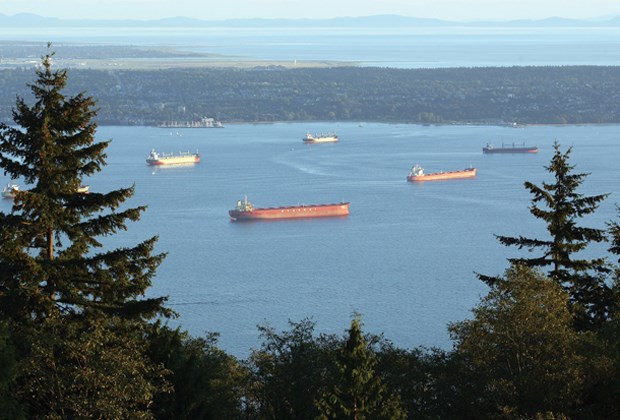An oil spill in the District of North Vancouver could go untreated for nearly six hours, according to a representative from the Western Canadian Marine Response Corporation who spoke to council Monday.
The discussion, which was likely a prelude to a larger public hearing, centred around the possible twinning of 980 kilometres of Kinder Morgan’s Trans Mountain pipeline and the risks in moving greater quantities of oil along B.C.’s shoreline.
“Six hours sounds like an awfully long time to build a boom at our closest beach,” said Mayor Richard Walton. “That could be catastrophic.”
The WCMRC recently tested their ability to deal with an oil spill in Maplewood Flats.
The cleanup crew dispatched a trailer with 5,000 feet of boom to the site in one hour. Taking the boom off the trailer would likely take 30 minutes followed by three or four hours of setup, according to WCMRC representative Mark Johncox.
Walton expressed concern about WCMRC’s ability to recover the totality of a spill. “If you had even a fairly small spill with a low percentage captured in our harbour, it could have a devastating impact to a very heavily populated and healthy shoreline in an urban area,” he said.
The WCMRC, which is funded by several oil companies including Kinder Morgan, has the task of treating any marine or shoreline oil spill with its booms and skimmers, many of which are housed in warehouses in Burnaby and Duncan.
There are several emergency scenarios the company has examined, according to Johncox.
Because of safeguards including tug escorts for laden tankers, which can only leave in optimal tide conditions while manned by two pilots, a collision in Vancouver harbour is unlikely, he said.
“Spills from a ship accident inside Vancouver Harbour . . . it’s almost impossible,” he said.
The pipeline twinning would likely result in one Aframax tanker at the harbour each day.
While bitumen sank into the water column following a massive spill in the Kalamazoo River in Michigan, bitumen would be unlikely to sink on B.C.’s coast, according to Johncox.
“I’m not going to say it cannot sink, because it can, but it requires a certain set of circumstances mostly absent from the environment here,” he said.
In the case of the Kalamazoo spill, the bitumen mixed with sand and sank through freshwater. The WCMRC has had very good results of recovering bitumen in test cases as well as a previous spill. Johncox was not certain of the tactics the WCMRC would take in the event bitumen sinks on B.C.’s coastline.
“We do have measures to take; it’s are we allowed to take them,” he said, referring to adding dispersant into the water. “Otherwise it’s towing snares on the ocean floor and trying to grasp it that way.”
Johncox noted that Coun. Lisa Muri looked confused during his presentation.
“I’m not confused. I’m afraid,” Muri responded.
Muri questioned how WCMRC would respond in a storm.
“We can’t respond in a full-on hurricane. Our first issue is: Is it safe to respond? If no, then nobody goes. It’s a safety of life issue,” Johncox said.
Transport Canada’s role of overseeing WCMRC is a concern for many District of North Vancouverites, according to Walton.
“The challenge is the trust issue . . . when the federal government appears to be driving this process and a lot of people assume it’s going to be approved regardless. That puts into question Transport Canada’s independence or efficacy,” he said. “Partnership with Transport Canada I get, but it doesn’t give me that warm, fuzzy feeling I should have.”
The WCMRC should work with the Tsleil-Waututh, said Coun. Alan Nixon. “There’s no point in the Tsleil-Waututh railing against it and setting their hair on fire about it,” he said. “I’d love them to be the custodians of your trailer with 5,000 feet of boom.”
When asked about the response to an oil spill south of the border, Johncox described the situation as a quagmire. “The American standards, it’s a nightmare. They don’t even know what they are. The U.S. Coast Guard couldn’t even tell us.”



